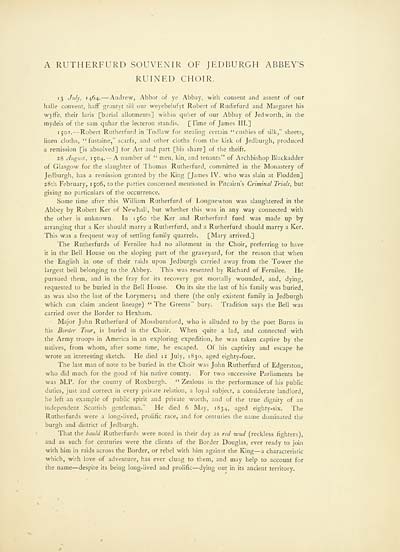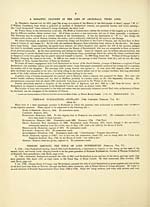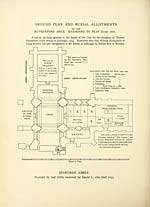Rutherfurds of that Ilk, and their cadets
(139) Page cxi
Download files
Complete book:
Individual page:
Thumbnail gallery: Grid view | List view

A RUTHERFURD SOUVENIR OF JEDBURGH ABBEY'S
RUINED CHOIR.
13 July, 1464. — Andrew, Abbot of ye Abbay, with consent and assent of our
halle convent, hafF grantyt till our weyebelufyt Robert of Rudirfurd and Margaret his
wyffe, their laris [burial allotments] within quher of our Abbay of Jedworth, in the
mydeis of the sam quhar the lecteron standis. [Time of James III.]
1502. — Robert Rutherfnrd in Todlaw for stealing certain "cushies of silk," sheets,
linen cloths, " fustaine," scarfs, and other cloths from the kirk of Jedburgh, produced
a remission [is absolved] for Art and part [his share] of the theift.
28 August, 1504. — A number of " men, kin, and tenants" of Archbishop Blackadder
of Glasgow for the slaughter of Thomas Rutherfurd, committed in the Monastery of
Jedburgh, has a remission granted by the King [James IV. who was slain at Flodden]
28th February, 1506, to the parties concerned mentioned in Pitcairn's Criminal Trials, but
giving no particulars of the occurrence.
Some time after this William Rutherfurd of Longnewton was slaughtered in the
Abbey by Robert Ker of Newhall, but whether this was in any way connected with
the other is unknown. In 1560 the Ker and Rutherfurd fued was made up by
arranging that a Ker should marry a Rutherfurd, and a Rutherfurd should marry a Ker.
This was a frequent way of settling family quarrels. [Mary arrived.]
The Rutherfurds of Fernilee had no allotment in the Choir, preferring to have
it in the Bell House on the sloping part of the graveyard, for the reason that when
the English in one of their raids upon Jedburgh carried away from the Tower the
largest bell belonging to the Abbey. This was resented by Richard of Fernilee. He
pursued them, and in the fray for its recovery got mortally wounded, and, dying,
requested to be buried in the Bell House. On its site the last of his family was buried,
as was also the last of the Lorymers; and there (the only existent family in Jedburgh
which can claim ancient lineage) "The Greens" bury. Tradition says the Bell was
carried over the Border to Hexham.
Major John Rutherfurd of Mossburnford, who is alluded to by the poet Burns in
his Border Tour, is buried in the Choir. When quite a lad, and connected with
the Army troops in America in an exploring expedition, he was taken captive by the
natives, from whom, after some time, he escaped. Of his captivity and escape he
wrote an interesting sketch. He died 12 July, 1830, aged eighty-four.
The last man of note to be buried in the Choir was John Rutherfurd of Edgerston,
who did much for the good of his native county. For two successive Parliaments he
was M.P. for the county of Roxburgh. " Zealous in the performance of his public
duties, just and correct in every private relation, a loyal subject, a considerate landlord,
he left an example of public spirit and private worth, and of the true dignity of an
independent Scottish gentleman." He died 6 May, 1834, aged eighty-six. The
Rutherfurds were a long-lived, prolific race, and for centuries the name dominated the
burgh and district of Jedburgh.
That the bauld Rutherfurds were noted in their day as red ivud (reckless fighters),
and as such for centuries were the clients of the Border Douglas, ever ready to join
with him in raids across the Border, or rebel with him against the King — a characteristic
which, with love of adventure, has ever clung to them, and may help to account for
the name — despite its being long-lived and prolific — dying out in its ancient territory.
RUINED CHOIR.
13 July, 1464. — Andrew, Abbot of ye Abbay, with consent and assent of our
halle convent, hafF grantyt till our weyebelufyt Robert of Rudirfurd and Margaret his
wyffe, their laris [burial allotments] within quher of our Abbay of Jedworth, in the
mydeis of the sam quhar the lecteron standis. [Time of James III.]
1502. — Robert Rutherfnrd in Todlaw for stealing certain "cushies of silk," sheets,
linen cloths, " fustaine," scarfs, and other cloths from the kirk of Jedburgh, produced
a remission [is absolved] for Art and part [his share] of the theift.
28 August, 1504. — A number of " men, kin, and tenants" of Archbishop Blackadder
of Glasgow for the slaughter of Thomas Rutherfurd, committed in the Monastery of
Jedburgh, has a remission granted by the King [James IV. who was slain at Flodden]
28th February, 1506, to the parties concerned mentioned in Pitcairn's Criminal Trials, but
giving no particulars of the occurrence.
Some time after this William Rutherfurd of Longnewton was slaughtered in the
Abbey by Robert Ker of Newhall, but whether this was in any way connected with
the other is unknown. In 1560 the Ker and Rutherfurd fued was made up by
arranging that a Ker should marry a Rutherfurd, and a Rutherfurd should marry a Ker.
This was a frequent way of settling family quarrels. [Mary arrived.]
The Rutherfurds of Fernilee had no allotment in the Choir, preferring to have
it in the Bell House on the sloping part of the graveyard, for the reason that when
the English in one of their raids upon Jedburgh carried away from the Tower the
largest bell belonging to the Abbey. This was resented by Richard of Fernilee. He
pursued them, and in the fray for its recovery got mortally wounded, and, dying,
requested to be buried in the Bell House. On its site the last of his family was buried,
as was also the last of the Lorymers; and there (the only existent family in Jedburgh
which can claim ancient lineage) "The Greens" bury. Tradition says the Bell was
carried over the Border to Hexham.
Major John Rutherfurd of Mossburnford, who is alluded to by the poet Burns in
his Border Tour, is buried in the Choir. When quite a lad, and connected with
the Army troops in America in an exploring expedition, he was taken captive by the
natives, from whom, after some time, he escaped. Of his captivity and escape he
wrote an interesting sketch. He died 12 July, 1830, aged eighty-four.
The last man of note to be buried in the Choir was John Rutherfurd of Edgerston,
who did much for the good of his native county. For two successive Parliaments he
was M.P. for the county of Roxburgh. " Zealous in the performance of his public
duties, just and correct in every private relation, a loyal subject, a considerate landlord,
he left an example of public spirit and private worth, and of the true dignity of an
independent Scottish gentleman." He died 6 May, 1834, aged eighty-six. The
Rutherfurds were a long-lived, prolific race, and for centuries the name dominated the
burgh and district of Jedburgh.
That the bauld Rutherfurds were noted in their day as red ivud (reckless fighters),
and as such for centuries were the clients of the Border Douglas, ever ready to join
with him in raids across the Border, or rebel with him against the King — a characteristic
which, with love of adventure, has ever clung to them, and may help to account for
the name — despite its being long-lived and prolific — dying out in its ancient territory.
Set display mode to:
![]() Universal Viewer |
Universal Viewer | ![]() Mirador |
Large image | Transcription
Mirador |
Large image | Transcription
Images and transcriptions on this page, including medium image downloads, may be used under the Creative Commons Attribution 4.0 International Licence unless otherwise stated. ![]()
| Histories of Scottish families > Rutherfurds of that Ilk, and their cadets > (139) Page cxi |
|---|
| Permanent URL | https://digital.nls.uk/95749003 |
|---|
| Description | A selection of almost 400 printed items relating to the history of Scottish families, mostly dating from the 19th and early 20th centuries. Includes memoirs, genealogies and clan histories, with a few produced by emigrant families. The earliest family history goes back to AD 916. |
|---|

